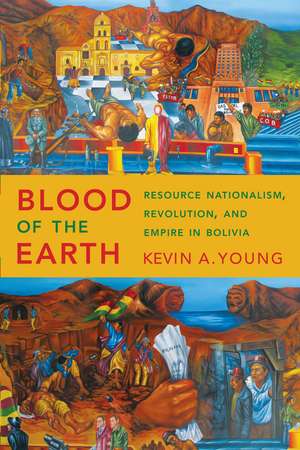Blood of the Earth: Resource Nationalism, Revolution, and Empire in Bolivia
Autor Kevin A. Youngen Limba Engleză Hardback – 14 feb 2017
Drawing on a wide array of Bolivian and US sources, Kevin A. Young reveals that Bolivia became a key site in a global battle among economic models, with grassroots coalitions demanding nationalist and egalitarian alternatives to market capitalism. While US-supported moderates within the revolutionary regime were able to defeat more radical forces, Young shows how the political culture of resource nationalism, though often comprising contradictory elements, constrained government actions and galvanized mobilizations against neoliberalism in later decades. His transnational and multilevel approach to the 1952 revolution illuminates the struggles among Bolivian popular sectors, government officials, and foreign powers, as well as the competing currents and visions within Bolivia’s popular political cultures. Offering a fresh appraisal of the Bolivian Revolution, resource nationalism, and the Cold War in Latin America, Blood of the Earth is an ideal case study for understanding the challenges shared by countries across the Global South.
Preț: 504.05 lei
Preț vechi: 654.61 lei
-23% Nou
Puncte Express: 756
Preț estimativ în valută:
96.46€ • 100.10$ • 80.62£
96.46€ • 100.10$ • 80.62£
Carte tipărită la comandă
Livrare economică 17-31 martie
Preluare comenzi: 021 569.72.76
Specificații
ISBN-13: 9781477311523
ISBN-10: 1477311521
Pagini: 288
Dimensiuni: 152 x 229 x 25 mm
Greutate: 0.52 kg
Editura: University of Texas Press
Colecția University of Texas Press
ISBN-10: 1477311521
Pagini: 288
Dimensiuni: 152 x 229 x 25 mm
Greutate: 0.52 kg
Editura: University of Texas Press
Colecția University of Texas Press
Notă biografică
Kevin A. Young is an assistant professor of history at the University of Massachusetts Amherst.
Cuprins
- Acknowledgments
- List of Abbreviations
- Introduction: Natural Resources, Economic Visions, and US Intervention in Twentieth-Century Bolivia
- 1. The Road to Resource Nationalism: Economic Ideas and Popular Coalitions in La Paz, 1927–1952
- 2. A New Type of Bolivian Economy: Competing Visions, 1952–1956
- 3. The Political Economy of Containment: Privatization, Austerity, and the MNR’s Shift to the Right, 1955–1964
- 4. The Battle for Men’s Minds: Economic Paradigms, Propaganda, and the Iconography of Revolution
- 5. The Limits of Containment: Anti-Austerity and Resource Nationalism in La Paz Factories
- 6. Oil and Nation: The Crusade to Save Bolivia’s Hydrocarbons
- Epilogue: Resource Nationalism and Popular Struggle in the Twenty-First Century
- Appendix: Professional Backgrounds of Key Middle-Class Participants in Economic Debates, 1940s–1960s
- Notes
- Bibliography
- Index
Recenzii
The importance of this book to contemporary conversations about extractivism in Bolivia cannot be overstated.
[Young] draws a complex and fascinating picture of the struggles over mining and oil from the Chaco War in the 1930s through the 1952 Revolution and the unraveling of the revolutionary state in the 1960s.
Young is to be congratulated on creating a comprehensive history of recent Bolivian history that also offers a new lens for interpreting Latin American populism. It is one of the finest examples of the recent, and very welcome, production of works on Latin American economic history.
Young expertly contextualizes his discussion of resource nationalism with previous attempts to bring natural resources under governmental control...[A] compelling and wonderful book.
Blood of the Earth makes a significant contribution to the historiography of the Bolivian revolution and provides new analytical insights into U.S. Cold War objectives in Latin America.
Blood of the Earth provides a compelling retelling of a Cold War story against the grain, in which the United States funded and tamed a revolution instead of intervening with force.
[Young's] detailed description of [the US government's public relations campaign aimed at taming resource nationalism in Bolivia] is certainly enlightening as it brings a hitherto unknown side of US interventions in Latin America to our attention.
Young's concept of 'resource nationalism' casts a new interpretive light on the Bolivian political scene of the 1950s and 1960s. It also provides continuity between the political ferment that followed the Bolivian Revolution of 1952 and the popular mobilization that led to the election of Evo Morales in December 2005.
Blood of the Earth is an intelligent and informative book that will be of interest to students of Bolivian history and present times, and to those who wish to explore resource nationalism in the Bolivian context...the material makes an important contribution to the field of Bolivian studies and the writing style contributes to a pleasant reading.
Descriere
Spanning the 1920s to the presidency of Evo Morales, this history traces how resource nationalism has pitted ordinary Bolivians against conservative Bolivian leaders, US officials, and foreign investors in a struggle to control the country’s natural wealt
